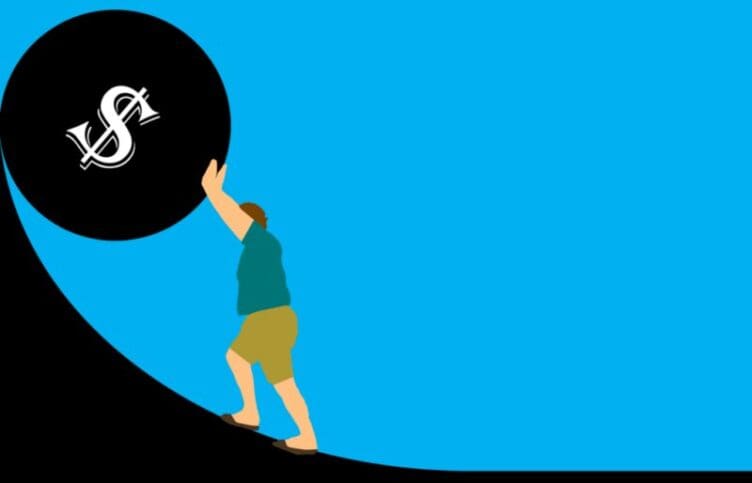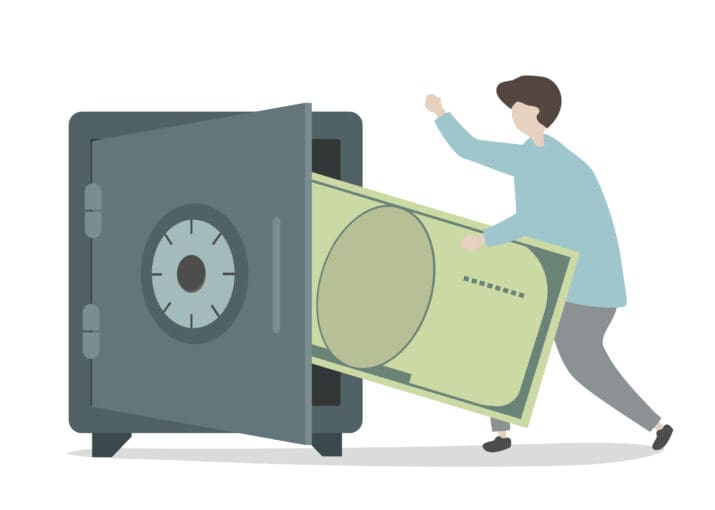Are you struggling to pay off debt and need help with your financial situation? Becoming debt-free can seem like a pipe dream, but with the right tools and tips, you can start paying off your debt and eventually your debt can become more manageable. Whether you’re considering a DIY approach, debt consolidation, or looking at debt relief options, this guide will provide you with options aligned to your specific situation.
Assessing Your Debt Load: A Crucial First Step
Before determining the best approach for eliminating your debt, you should start with understanding your debt-to-income ratio. The debt-to-income (DTI) ratio is a financial metric that compares your total debt payments to your gross monthly income. Lenders use the DTI ratio to assess your ability to manage debt and make loan repayments. A lower DTI ratio is generally better as it indicates a smaller portion of income is used for debt payments.
This ratio also helps you gain a realistic understanding of your financial situation, enabling you to make informed decisions. Depending on the amount you owe compared to your income, you can determine whether a DIY strategy is viable or if you should explore debt relief options.
DIY Debt Elimination Methods
Two popular DIY strategies for paying off debt are the debt snowball and debt avalanche methods. Each method offers distinct advantages.
Debt Snowball
The debt snowball method to pay off debt involves prioritizing the repayment of your smallest debt balance first. By channeling all available extra funds toward this debt while continuing to pay the minimums on other debts, you create a sense of accomplishment as you see debts being eliminated. Once the smallest debt is paid off, you roll the amount previously allocated to it into the minimum payment of the next largest debt, gradually increasing your repayment power like a snowball gaining momentum.
Debt Avalanche
On the other hand, the debt avalanche method to pay off debt focuses on tackling debts with the highest interest rates first, while paying minimums on other debts. This approach saves you money in the long run by targeting the costliest debts early on. However, it may take longer to completely pay off the first debt, and if you prefer quicker victories to stay motivated, the debt snowball method might be more suitable for you.
Debt Consolidation for Faster Debt Elimination
Debt consolidation is another efficient way to pay off debt. This process involves combining high-interest debts, such as credit card balances, into a single monthly payment, typically at a lower interest rate. The benefits of debt consolidation include:
To consolidate your debts, you can explore options such as balance transfer credit cards or debt consolidation loans. Keep in mind that qualifying for these solutions usually requires a good credit score, typically around 690 or higher. Additionally, you may also consider alternatives like borrowing from your 401(k) or utilizing your home equity. However, think carefully about the risks involved, as these options could impact your retirement savings or put your home at risk.
Boost Your Debt Payoff Efforts with Effective Budgeting
If you find it challenging to allocate a portion of your weekly or monthly paycheck to pay off debt, implementing a budgeting strategy can be immensely helpful. If you’re on a tighter budget, understanding how to budget on a low income can be particularly helpful. Tracking your income and expenses provides valuable insights, allowing you to identify areas where you can cut costs.
There are various approaches, such as the zero-based budgeting method, the envelope system, or the 50/30/20 budget. Experiment with different methods to find the one that resonates with you. Fortunately, there are plenty of budgeting apps and tools that simplify the process by automating payments, categorizing expenses, and providing a comprehensive overview of your financial accounts.
Actively Manage Your Debt
Some debts are a fact of life, and cannot be eliminated quickly, such as a mortgage. But you can still take steps to reduce your monthly payments as much as possible. Most mortgages have an initial or ‘honeymoon’ period of a few years with a much cheaper interest rate. When the initial term has expired you should shop around for better deals with alternative providers before your mortgage interest rate rolls over to a higher rate.
Not being aware of when your initial term expires and just staying with your current mortgage is sometimes referred to as passive borrowing. It can leave you exposed to passive borrowing rollover risk. You’ll find this is a risk for many different types of loans and other debt products.
Lower Your Monthly Bills to Accelerate Debt Repayment
Reducing your monthly expenses can significantly contribute to your debt repayment efforts. Every small reduction in bills creates more available funds that can be used to pay off debt. Take proactive steps to negotiate better rates with service providers for expenses like your cell phone bill, energy bill, car insurance, credit cards, gym memberships, or cable services.
Consider reaching out to different companies to compare rates and explore potential savings. If necessary, be persistent in following up and don’t hesitate to switch providers if it results in a better deal. These seemingly minor adjustments can add up and make a substantial impact on your overall financial situation.
Increase Your Income to Accelerate Debt Repayment
Finding ways to increase your income, even temporarily, can provide a significant boost to your debt repayment plan. Consider exploring opportunities for part-time employment, selling unused or gently used items, or utilizing your skills for freelance work. Starting a side hustle, such as house sitting, driving for rideshare services like Uber or Lyft, or dog walking, can also provide additional income to help you pay off debt.
Additionally, don’t overlook the potential for a salary increase in your current job. Before cornering your boss, thoroughly research and prepare to negotiate for higher compensation, leveraging your skills, experience, and contributions to the organization. Even a modest increase can have a substantial impact on your debt repayment efforts.
Debt Relief: Exploring Viable Options
If you’ve exhausted various strategies like budgeting, negotiating payments, and boosting your income without making significant progress, debt relief may be a viable option. Debt relief programs aim to modify the amount or terms of your debt to alleviate your financial burden. However, it’s important to note that debt relief is not suitable for everyone.
Debt Management Plan
A debt management plan (DMP) is a program that helps you pay off debt. It is a key tool to rebuilding your credit during Chapter 13 bankruptcy and involves working with a credit counseling agency to negotiate lower interest rates and consolidate multiple debts into one monthly payment. The agency distributes the payment to creditors until the debts are fully repaid. DMPs can provide financial education and support along the way.
There are several reputable credit counseling agencies that provide debt management and financial counseling services. Here are a few well-known organizations:
Bankruptcy
Bankruptcy, specifically Chapter 7 or Chapter 13, represents another form of debt relief. Chapter 7 erases most unsecured debts, while Chapter 13 involves a court-approved repayment plan spanning three to five years.
Various organizations and resources specialize in providing assistance and information related to bankruptcy for individuals. Here are a few well-known ones:
Debt Settlement
Debt settlement is a way to resolve outstanding debts by negotiating with creditors to accept a reduced payment. It can be done directly or with the help of a specialized organization (take a look at the list provided earlier in this article). Debt settlement may be an option if you are unable to qualify for bankruptcy or prefer to avoid it. However, it’s important to consider potential credit score impacts and the risks involved before pursuing debt settlement.
Paying off debt requires a strategic approach tailored to your specific circumstances. Assessing your debt load, reducing expenses, and investigating ways to increase your income are the best first steps. By exploring DIY methods, considering debt consolidation, implementing effective budgeting strategies, and exploring debt relief options if necessary, you can eventually become debt-free.



